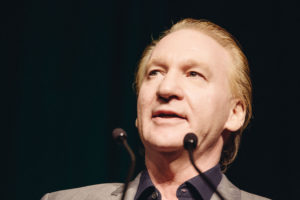Could This California Race Tip Congress to the Democrats?
In the Los Angeles suburb of Santa Clarita, volunteers for Katie Hill’s campaign are doing their part to reclaim their democracy. Santa Clarita, Calif. (Jeff Turner / Flickr)
Santa Clarita, Calif. (Jeff Turner / Flickr)
“Abortion. Murder.” That was one eligible voter’s emphatic answer to volunteer Gale Vogel’s pitch for Katie Hill, a pro-choice candidate running for Congress in the kind of suburban Los Angeles district Democrats must flip in order to win control of the House in November.
He was so emphatic, in fact, that I could hear his voice clearly from where I was standing on the sidewalk, a substantial distance from the house. Vogel had asked him about the issues that guided his decision at the ballot box.
“I enjoyed talking to you,” she said. “Any other issues?”
“Abortion,” he repeated loudly.
“Not a vote for Hill,” Vogel commented as she moved on to a neighboring residence. She walked the rolling hills of the Santa Clarita subdivision at a brisk pace, even though the temperature hovered in the mid-90s.
At one house at the end of a steep driveway, a couple greeted her in a friendly manner. The man liked candidate Hill. He supports Christine Blasey Ford, who has accused Supreme Court nominee Brett Kavanaugh of sexual assault. He watches Bill Maher on HBO. “I appreciate everything you guys are doing,” he told Vogel.
Katie Hill is the executive director of a nonprofit organization assisting the homeless. She’s never held political office but was active in the successful campaign for Los Angeles ballot measures to provide housing and other services for the indigent. The Republican incumbent, Steve Knight, is a former Los Angeles police officer and Army veteran who previously served in the state Legislature. He was elected to the House in 2014.
Knight’s re-election is crucial to the GOP, which maintains a slim majority in the 435-member House. In heavily Democratic California, Democrats hold 39 of the 53 House seats, and Republicans can’t afford to lose a single contest. As of now, California’s 25th District is rated a toss-up by the authoritative Cook Political Report. In the last presidential election, Hillary Clinton barely emerged victorious there, earning 50.3 percent of the vote.
On Saturday, I drove to Santa Clarita, a city about 35 miles northwest of downtown Los Angeles. Located in the Santa Clarita Valley and surrounded by barren hills and subdivisions, it’s one of the most affluent parts of the district, with a median income of $82,607. The area’s boundaries extend eastward to the high desert around Palmdale and Lancaster, where incomes and home values are lower.
At Hill headquarters in a Santa Clarita shopping mall, regional field director Angela Giacchetti was assembling the women and men who would canvass the neighborhood. They ranged from millennials to such baby boomers as former Los Angeles District Attorney Gil Garcetti, who had offered his services for the afternoon.
I joined Vogel, who lives in Santa Clarita, and her canvassing partner, Ellen O’Laughlin, a Los Angeles Unified School District teacher who had driven many miles from her home in Hawthorne, close to Los Angeles International Airport. O’Laughlin had not been active politically until Donald Trump was elected president. “I watched the debates. That was it,” she said.
“I’ve never done this before,” Vogel echoed as she drove us to their assigned neighborhood. “I’d only been marginally interested.” Over the past two years, she has protested Trump’s immigration crackdown and knocked on doors, even in the occasionally grueling California heat.
The Hill campaign recruited Vogel and O’Laughlin through ads on Facebook and other social media, later sending them a list of voters they were to contact that day. One of their phone screens looked like a Google map, showing the houses designated for a visit. Another had the names of the homes’ occupants, along with their party registration and voting history. Vogel’s phone contained 76 names, her quota for the afternoon.
Canvassing is as old as politics itself. At the turn of the 20th century, big-city bosses sent workers out to apartments, tenements and saloons, looking for support. When I began my career in journalism many years ago, the canvassers carried clipboards with paper lists of voters. Over the last 18 months, these have largely been replaced by phone apps and email.
On a street of virtually identical two-story homes, Vogel rang a bell. The person listed had moved. “OK, thank you,” she said, tapping away on her cellphone.
A separate house had two signs—“No solicitors” and “Beware of the dog.” She entered “inaccessible” on her phone. At another residence, a man said he “kinda liked Katie.” She put him down as a Katie Hill supporter, sending her entry to the Hill campaign in real time.
How did Vogel gain access to so much information in the first place? The Hill campaign had either gathered it on its own or hired one of the growing number of private companies that assemble such lists. Zillow, for example, lists the value of every home; the Department of Motor Vehicles provides car registration. Marketers know an inordinate amount about buying habits, religion, reading, clothing and food tastes. Each of these data points is then sorted by computers and loaded onto a list of potential voters.
Campaigns are most interested in what political professionals call “the likely voter universe.” This might include someone who voted in two of the last four election cycles. The man who “kinda liked Katie” probably made the list. He and others like him will be targeted with further visits and phone calls as Election Day nears.
But technology alone won’t win this election. Trump’s widespread unpopularity will cost him votes, as will his treatment of Kavanaugh’s accusers specifically and women more generally. Ultimately, however, it will come down to volunteers like Vogel and O’Laughlin to turn out Democratic voters. In a hotly contested election cycle, this could make the difference in the 25th District and others across the country.
“Who is going to step up and say [to Trump], ‘You can’t do this’?” Vogel said. “I guess it is us.”
Your support matters…Independent journalism is under threat and overshadowed by heavily funded mainstream media.
You can help level the playing field. Become a member.
Your tax-deductible contribution keeps us digging beneath the headlines to give you thought-provoking, investigative reporting and analysis that unearths what's really happening- without compromise.
Give today to support our courageous, independent journalists.






You need to be a supporter to comment.
There are currently no responses to this article.
Be the first to respond.